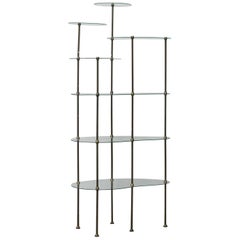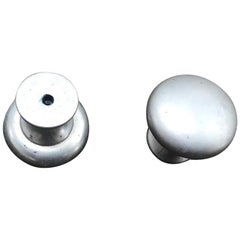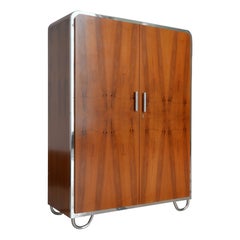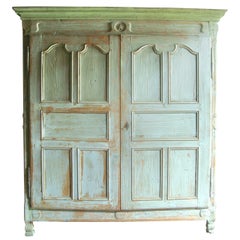Casey Godrie Amsterdam 20th Century Icons & Props Cupboards
to
Height
to
Width
to
Depth
to
2
2
1
1
2
2
1
1
2
1
1
2
1
1
2
2
2
Spectacular Fifties Etagere from Bonbon shop in Paris for Exclusive Objects
By Isamu Noguchi
Located in Amsterdam IJMuiden, NL
This item is part of the private collection of Casey Godrie and is situated in his private house. Ask him for competitive shipping quotes. His incredible Dune Villa, Amsterdam Beach, check last pictures on this listing and/or find more details on his family name plus eu, is for sale soon too. :-)
Beautiful iconic fifties eye catcher étagère for small eye catchers ! This display was decades in a chocolate shop in Paris...
Category
Vintage 1950s French Mid-Century Modern Cupboards
Materials
Brass
Elegant Industrial Heavy, Metal Doorknob, circa 1960
Located in Amsterdam IJMuiden, NL
This item is part of the private collection of Casey Godrie and is situated in his private house. Ask him for competitive shipping quotes. His incredible Dune Villa, Amsterdam Beach...
Category
Vintage 1960s German Industrial Wardrobes and Armoires
Materials
Metal
Related Items
Art Deco-Streamline 2-Door Wardrobe, Chrome-Plated Metal, Walnut Veneer, c. 1935
By Hana Kucerova-Zaveska, Robert Slezák
Located in Berlin, DE
Art Deco- streamline 2-door wardrobe designed by Arch. Hana Kucerová-Záveská (Czech, 1904–1944) and manufactured by Robert Slezák Company, circa 1935. The outstanding form of this wa...
Category
Vintage 1930s Czech Art Deco Cupboards
Materials
Metal, Chrome
$8,267
H 70.48 in W 47.64 in D 22.05 in
Very Large Armoire - France, 18th Century
Located in Isle Sur La Sorgue, Vaucluse
Impressive cupboard from a convent (1 meter deep). Carved details, original hinges and key, original paint (except for the cornice).
The interior can be adapted according to speci...
Category
Antique 18th Century and Earlier French Country Wardrobes and Armoires
18th Century Painted Dutch Country Knockdown Cupboard
Located in Sheffield, MA
A rare large and impressive 18th-century Dutch painted knockdown country cupboard has more than all the charm of Country French or Swedish cabinet. The paint work has been carefully...
Category
Antique Late 18th Century Unknown Country Cupboards
Materials
Wood
An 18th Century Neoclassical Mahogany Armoire With Marquetry Inlay, Circa 1770
Located in Brighton, West Sussex
An 18th century Dutch neoclassical mahogany armoire with floral marquetry inlay.
Dutch, circa 1770. The marquetry inlay circa 1860.
The impressive and very decorative armoire ...
Category
Antique Late 18th Century Dutch Neoclassical Wardrobes and Armoires
Materials
Mahogany
$8,222
H 112.21 in W 66.54 in D 22.05 in
Art Deco Sideboard in Amboyna and Rosewood Paris, c1925
Located in Paddock Wood Tonbridge, GB
A French Art Deco sideboard produced in Paris in the 1920’s black and white marble top on a solid oak framed cabinet with amboyna and rosewood with carved motifs of flowers and fruit...
Category
Vintage 1920s French Art Deco Sideboards
Materials
Oak, Rosewood, Amboyna
Antique Shop Cabinet w/Overhanging Canopy Bonnet Top- A Great Statement Piece!
Located in Atlanta, GA
A fabulous early 19th century American shop cabinet with upper glass doors and a pronounced canopy bonnet. This unique antique display and storage cabinet, standing approximately 8.5...
Category
Antique 19th Century American Cabinets
Materials
Glass, Wood
$8,700
H 103 in W 63 in D 30.5 in
Entryway Cabinet Made In Mahogany From 1880s
Located in Lejre, DK
The entryway cabinet, crafted from rich mahogany, stands as a testament to the elegance and craftsmanship of the late 19th century. Dating back to aro...
Category
Antique 1880s Danish Other Cabinets
Materials
Mahogany
Unique Vintage Industrial Metal Hutch
By Simmons Company Furniture, Hamilton
Located in Brooklyn, NY
Bring home the unique practicality of America's industrial age with this unusual vintage steel hutch! Standing tall in a compact 2'x2' footprint, this tiered cupboard features a slen...
Category
Early 20th Century American Industrial Cupboards
Materials
Metal, Steel, Chrome, Sheet Metal
Bohemian 1950 Handmade Bentwood Bamboo, Reed & Cane Etagere, Bookcase, Cupboard
Located in Miami, FL
American Mid-Century Modern handcrafted 5 tier etagere, bookcase or cupboard made out of Bentwood Bamboo, Reed and hand woven cane shelves.
All original 1950s condition with some mi...
Category
Vintage 1950s American Bohemian Cupboards
Materials
Bamboo, Cane, Reed, Bentwood
$1,950
H 73 in W 35.5 in D 16 in
Object 021 Cabinet by Ng Design
Located in Geneve, CH
Object 021 cabinet by NG Design
Dimensions: D66 x W38 x H120 cm
Materials: Powder coated steel, Tempered Glass.
Also Available: All of objects available in different materials a...
Category
2010s Polish Post-Modern Cabinets
Materials
Steel
circa 1800 Sublime Hand Painted European Wardrobe or House Cupboard in Solid Oak
Located in West Sussex, Pulborough
We are delighted to offer this stunning original central European circa 1800 hand painted with floral detailing wardrobe.
An exceptionally good looking well made and collectable w...
Category
Antique Early 1800s European Georgian Wardrobes and Armoires
Materials
Oak
$8,907
H 80.71 in W 74.81 in D 27.76 in
Rare Moses Michelangelo Guggenheim & Pauly Cie Et Venice Antique Carved Armoire
By Guggenheim Museum, Pauly et Cie
Located in West Sussex, Pulborough
We are delighted to offer for sale this very rare one of a kind Pauly CIE Et stamped hand carved walnut armoire made by the genius that was Moses Michelangelo Guggenheim 1837-1910
Where to begin, this cabinet is stamped to the rear “Fabrique De Meubles Pauly & Cie Venise. Pauly & Cie” who were a world famous glass foundry and later equally famous furniture manufacturer. Their grotto furniture has an immense following across the world. This piece was most likely retailed through them as it was made by Moses Michelangelo Guggenheim who is a fellow venetian
There is one other known example of his works which is very similar, it is currently retailing for no less than £900,000 however it is accompanied by a few other pieces from a drawing room suite. The suite came from Palazzo Papadopoli, a Renaissance palace on the Grand Canal in Venice built for the Coccini family by Giovanni de Grigi around 1560. I will include some further history below on both Pauly CIE ET and Moses Michelangelo Guggenheium
On to the armoire, it is clearly the most ornate tour de force of carving you will ever see, I’m thankful it has managed to survive so long without being broken up by salvagers looking to reclaim the sculptures. You can see in the carving elements of Pauly’s inspiration in the form of shells. You also have Putti’s riding dolphins and so on. We have fully treated it as there were various signs of old worm, it’s then been cleaned waxed and polished. One of the hidden hinges has been replaced, otherwise it is in near perfect condition for the age. The insides houses three wood shelves
Dimensions
Height 255.5cm top to bottom, without the removable top carving 211cm
Width 170cm arm to arm of the chaps on the outside, 172cm at the top, 166cm at the bottom
Depth 63cm top, 55cm middle, 59cm bottom
Please note all measurements are taken at the widest point
Moses Michelangelo Guggenheim
Leading expert of decorative arts in late 19th century Venice, Michelangelo Guggenheim (1831-1910) also was one of the greatest antiquarians and a modern furniture producer in the “City of Water”. His collections stored in the Balbi Palace on the Grand Canal were an outstanding sight, that art amateurs would recommend.
At the age of 20, he founds a "Stabilimento d’arti decorative e industriali" which purpose is the industrial creation of objects bearing an artistic force. The furniture that made him worldwide famous re-imagines ancient styles, freeing their aesthetic powers to serve modern imagination. Often in walnut, his pieces of furniture sent to World Fairs impress people by the finesse of their sculptures.
A prized designer as well, he reorganizes princely interiors in the same spirit. His most famous work is the Palazzo Papadopoli's design about 1874, where he unfolds the vocabulary of several periods. He conceives there a richly furnished Neo-Renaissance Cabinet that relived the Italian golden age. For the exceptional result he is awarded the Gold Medal of merit for science and arts by Ludwig II of Bavaria.
Pauly & Cie Venise
Since its foundation (1866), Pauly & C. has stood for elegance, creativity and Venetian luxury. The ancient Roman technique known as “murrine”, which today is the symbol of Murano glass, was reproduced for the first time in its workshops and was presented to the world at the Universal Exhibition in Paris in 1878.
In 150 years of business Pauly & C. has produced unique works for royal palaces, public buildings, private villas and has served an international client base that includes some of the most prominent names from the world of culture and art, figures from the world of industry and finance, politicians and nobility.
Pauly & C. - C.V.M. (compagnia Venezia Murano) works are currently held in many private collections and exhibited in some of the most prestigious museums in the world.
In the last years of activity, Pauly has been active with three distinct brands: • Pauly & C. CVM, the time-honoured company that produces classic objects, recreating old designs and collections and offering modern reinterpretations of them. • Pauly Glass Factory, which continues its association with artists and designers to produce artistic works with modern lines. • MVM Interior operates throughout the world with architects, interior designers and design studios for the creation of prestigious personalized projects
History
Compagnia di Venezia e Murano C.V.M. began as Salviati &C. in London in 1866 under the direction of Vicenza attorney Antonio Salviati and with the backing of two British men: archaeologist Austen Henry Layard and antiquarian Sir William Drake.
The company was dedicated to using ancient techniques and utilized master glassblowers in its efforts to do so. It called in specialists from other fields like goldsmithing and engraving to ensure authenticity and employed artist Giuseppe Devers to teach the techniques of enamelling and heat-applied glass gilding to company artisans.
Archaeologist Layard was particularly interested in the mosaic glass techniques of Roman and pre-Roman artists, and he spent years personally overseeing the work of the company's technicians and glassblowers in attempting to revive those techniques. In 1872, the company was successful, managing to replicate the type of glass commonly known as "murrina". The company was renamed Venice and Murano Glass and Mosaic Company Limited in 1872, and, in 1877, Layard purchased Salviati's interest so that Salviati could pursue other interests.
The company quickly earned a reputation for quality original glass art and reproductions as well as its many mural mosaics in Great Britain and elsewhere in Europe. In 1878, the murrine produced by Compagnia di Venezia e Murano was included in its exhibit at the International Exhibition in Paris, which was the chief attraction in Italian glass. In its observations of the display, the United States Commission to the Paris exposition commented not only on "Roman murrine glass", but also particularly on the mural glass mosaics, the "perfection of which" had "engaged the earnest attention of the company." Mosaics produced by the company during the time period are still in existence in diverse areas such as Gonville and Caius...
Category
Antique 19th Century Italian Victorian Wardrobes and Armoires
Materials
Walnut
$206,462 Sale Price
40% Off
H 100.6 in W 66.93 in D 24.81 in



